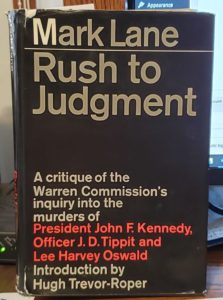
It wasn’t too long ago that I reviewed Mark Lane’s Plausible Denial, a book about the JFK assassination. This was the first thing of Mark Lane’s I had read. I’d heard his name often, as he was an early critic of the Warren Commission often cited by other writers. I never read his first book on the subject, until now.
Rush to Judgment was published in 1966. Aside from articles in magazines, I believe this was the first book published critical of the Commission. Lane was in a unique place, having been hired by Marguerite Oswald, Lee Harvey Oswald’s mother, to function essentially as Oswald’s defense attorney during Commission deliberations. That’s a simplification. But it put Lane in some meetings and hearings, and allowed him to see things, that were denied to most not directly associated with the Commission’s work.
Lane, who died in 2016, was a lawyer. Much of Rush to Judgment deals with the minutia of legal issues. He criticized the Commission for not following rules of evidence and rules of cross-examination as you would have at a trial. He looked at evidence that law enforcement agencies had given to the Commission and found it wanting. For example, Lane spends a lot of time on the paraffin test applied to Oswald to show if he had recently fired a gun. The police said the test was positive, whereas Lane showed the inconsistency in the test and was critical of police statements, even before the test results were available, that said the test would be found positive.
No witnesses were subject to cross-examination during Commission hearings. Lane took transcripts of the testimony of many witnesses and picked it apart. A woman who saw the murderer of police officer J.D. Tippet is alleged to have identified Oswald as the man, but her statements and response to a police line-up were inconclusive. To Lane, she described a different man. While no official cross-examinations were make, Lane showed how lawyers for the Commission did critically question witnesses who told something other than what the Commission’s foreordained conclusion was.
Lane was critical of the witness list. Many witnesses were never questioned; others were questioned only by the Commission’s lawyers. These were witnesses who were in Dealy Plaza, or who knew Oswald, or who knew Jack Ruby, or who had other information about the three murders (Kennedy, Tippet, and Oswald). He makes a good case that the Commission’s work was sloppy and incomplete and that, had the rules of a courtroom been followed, the Commission never could have come to the conclusion it did.
The book is good. A couple of times Lane heads down rabbit holes, spending too much time on small items. A number of times Lane uses legal vocabulary that requires a dictionary. I looked a few of those up, but further into the book just skipped over them, doing the best I could based on the context. The organization of the book was fine, as was the length and the quality of the writing.
As this is an early book in JFK assassination research, it lacks some details that other authors brought out. One has to remember when it was written, however, in order form a judgment on the book.
As I have accumulated a fairly significant, though far from comprehensive, collection of JFK assassination books, I will keep this one. Will I ever reread it? I don’t know for sure, but maybe.